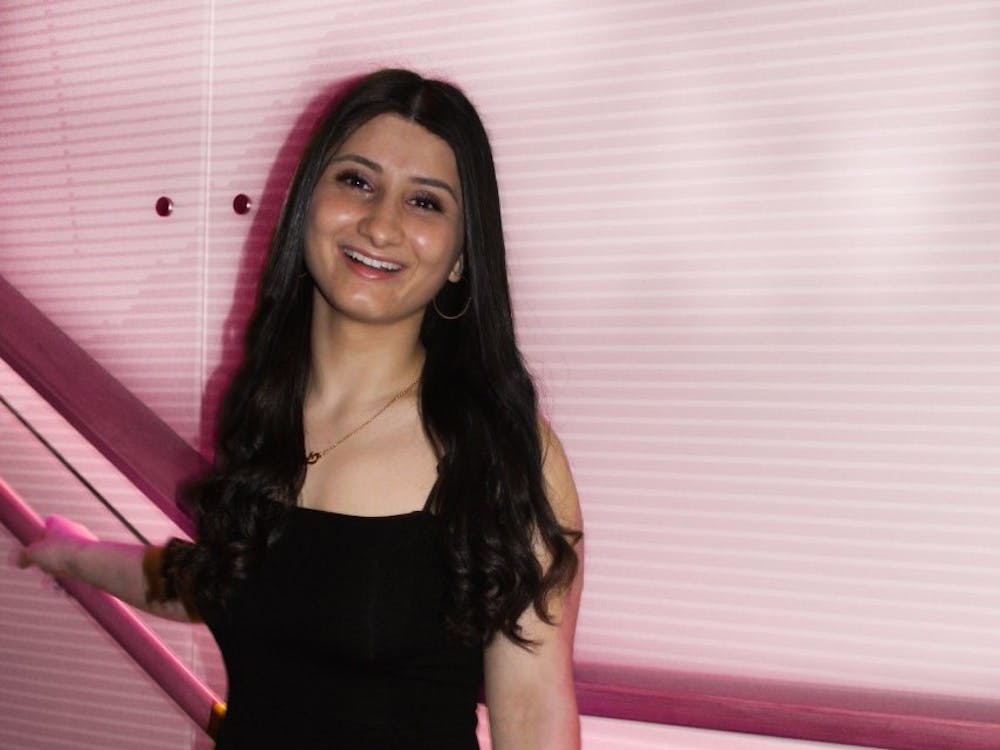Sophomore and executive vice presidential candidate Dina Qiryaqoz hopes to redefine the Duke Student Government EVP position and advocate for students.
Qiryaqoz currently serves as a senator on DSG’s academic affairs committee, but she said that part of the reason she joined DSG was that she didn’t have to limit herself to a single issue.
“I’ve always been involved in student government, but doing it at Duke was almost perfect for me because it [allowed] me to engage in many different communities and different issues on campus,” she said.
Qiryaqoz’s platform includes the creation of an alternative spring break program, bolstering efforts to prevent sexual harassment and assault, advocating on behalf of minority groups and changing DSG internal policy to best serve the student body.
Alternative spring break is a program that allows students to pursue service opportunities in various locations around the United States. Harvard University and the University of North Carolina at Chapel Hill currently offer a similar program, but Duke does not have such a program.
Qiryaqoz began advocating for the new program as a non-academic alternative to Spring Breakthrough, which had issues with low enrollment this year. As a low-income, first-generation student, she also views alternative spring break as a great opportunity for students who cannot afford to go home during the break.
“For me, having a different option would be better than staying on campus and doing nothing, and I know that’s a reality for a lot of different people as well,” Qiryaqoz said.
Qiryaqoz’s platform is also influenced by her experience as a student of color born outside of the United States, she said. She and her family arrived in the United States from Iraq in 2007 after being granted special refugee status, which she said allows her to empathize with the struggles that international students face in learning a new language and adjusting to a new environment.
She also highlighted a lack of awareness of these challenges.
“It makes me cognizant of how little the international experience is recognized by Duke students,” Qiryaqoz said.
Qiryaqoz wants to invite more student groups, especially identity groups, to speak at DSG Senate meetings so that they can present the work they’re doing or ask for assistance.
“All we really get from student groups is the [Student Organization Finance Committee] funding request, and we kind of just approve those and let them happen,” she said. “I feel like as senators we could do a lot more to help.”
Inviting people to speak at meetings is one role of the EVP that hasn’t been fulfilled recently, Qiryaqoz said. She said that the EVP role has become “muddy” in recent years and that she aims to reintroduce some of the duties delineated in the DSG by-law.
She said that DSG 101 sessions—training for incoming senators—are currently led by Director of Student Involvement Gerald Harris, but these sessions were previously led by the EVP. Qiryaqoz said she wants to collaborate with Harris for future sessions and contribute her student perspective.
Qiryaqoz also plans to become involved with the expansion of Sexual Harassment and Assault Prevention and Education Week, and she said this was partially influenced by her experience teaching the house course “Women’s Empowerment.” Students taking the house course were not aware of what rape kits were or what the process of reporting sexual misconduct at Duke entailed, she explained, which made her realize that more education on the matter was necessary.
Sophomore Jackson Kennedy, a friend and fellow senator of academic affairs, is confident in her ability to drive positive change.
“Her advocacy and approach to her day-to-day life, in a word, is relentless,” he wrote in an email to The Chronicle. “Imagine the feeling you have Jan. 1, about how this year you’re going to work out every day, how this year you’ll finally stop procrastinating. For Dina, every day is Jan. 1.”
Get The Chronicle straight to your inbox
Sign up for our weekly newsletter. Cancel at any time.
Kennedy also wrote that Qiryaqoz “would listen to anyone,” and that she understands the intersectional nature of problems on campus.
Colleen Scott, director of the Baldwin Scholars program, described Qiryaqoz as ambitious, humble and caring.
“She pushes us to be better as an organization,” Scott wrote in an email to The Chronicle.
Scott highlighted Qiryaqoz’s involvement with the Month of Mae campaign, a series of events centered around women in STEM culminating with a Mae Jemison talk on Feb. 24. Qiryaqoz delegated tasks, oversaw the execution of events and “[made] sure everyone’s voices were heard in the planning process”.
“She has both vision and the willingness to do the hard work to make the vision happen,” Scott wrote.

Nadia Bey, Trinity '23, was managing editor for The Chronicle's 117th volume and digital strategy director for Volume 118.

